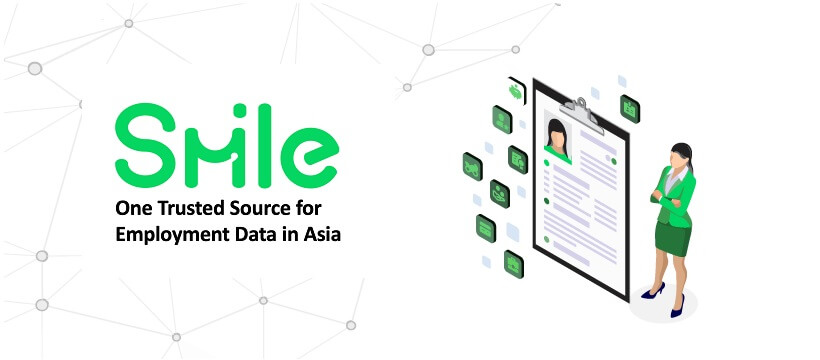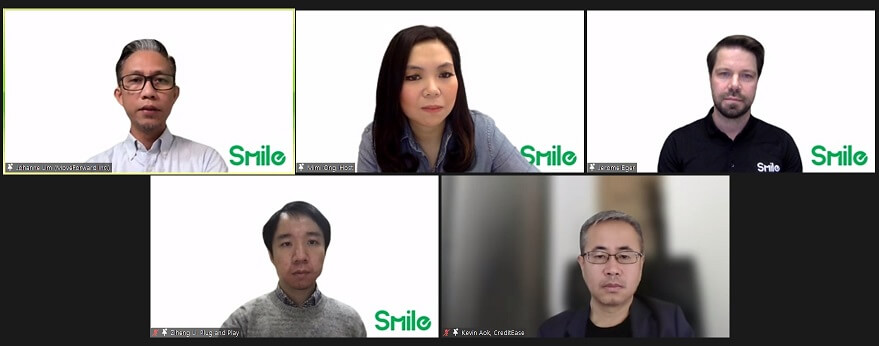Applicant, employer, and financial institution or vendor must all be involved in the loan application procedure. Smile API is a digital platform that speeds up the application approval (or rejection) procedure.
From left: Smile API CEO Jerome Eger; Senior Ventures Analyst at Plug and Play Singapore Ziheng Li, MoveForward Inc. CEO Johanne Lim; Event host and media personality Mimi Ong; Bottom row: Head of Strategic Investment and M&A from Credit Ease, Kevin Aok.
Smile API is a digital platform that fast-tracks the process by facilitating application approval (or rejection) within just a few seconds. As a result, it delivers significant value to workers who need to secure financial and/or related services; employers who can recover operational time lost to the cumbersome paper trail; and banks and financial institutions that can experience fast, secure transactions in the many moribund application procedures.
During the recent company launch, Smile API CEO Jerome Eger explains the all-too-common situation that bogs down businesses: “We did a survey and found that on average, for every 100 employees in any given company, there are three to five requests for certificates of employment per week. A person in HR handles this, and it takes company time that can be better used for other business matters. While they need to do this, this process has no value for the employers.”
Eger adds, “What we offer becomes not just a win but a win-win-win solution for businesses, their employees, and mostly for third-party providers like banks, financial institutions, and other vendors whose services are made more accessible to potential customers.”
Individuals register first through the Smile-API-using companies they regularly deal with or interact with. They agree to transmit their encrypted employment data which then passes from their employer through Smile API to the bank or vendor in seconds, when they apply for loans, financing, deferred payment terms, employment, or financial services.
It is important to note that this is a one-time transaction. Smile API gets the encrypted data from the employer and passes it on to the institution or the vendor. It does not hold on to the data afterward. This process happens in seconds, and the applicant, their employer, and the related banks are spared the loss of unnecessary manhours and effort, as well as the stress that comes with waiting for (or working towards) the approval which may or may not is given.
Smile API’s platform was conceived from a simple, yet important truth that affects virtually everyone, especially the workforce, without their knowing it. People can never fully control their personal and employee data. Their employment data---the most relevant to financial institutions, vendors, or even potential new employers---will always need to be obtained from and verified by third parties through documentation, like certificates of employment, payslips, proofs of billing, bank statements, credit card statements, or even academic transcripts of records.
To escape this cycle of inefficiency, Eger asserts that the individual must realize that “having access to data is a basic right. Your data is very important, as data is the oil of the 21st century.
The difference is: then few people had oil, now, everyone has data.” In contrast, he adds, “Smile API empowers people to have their own data, and to use that data for their own good.”
Eger likens Smile API to infrastructure that connects, using technology: "We provide bridges that allow data to move quickly between employer to bank or vendor, but the user has complete control of whether or not they cross the bridge. The customer has to grant explicit consent for each transaction, and decides what data is shared with whom and at what time."
Kevin Aok, Head of Strategic Investment and M&A from Credit Ease, explains why Smile API is eyeing the Philippines first: "We are looking for markets with a higher potential growth rate.
Many Filipinos have a stable income and the Philippines is largely English-speaking. "Ziheng Li, Senior Ventures Analyst at Plug and Play Singapore, shares why Smile API is the right API for the region at this time: "Unlike other global markets such as the US and China, where employer data APIs are common, there is no API or service similar to Smile API in the region."
As early as now, Smile API is already forming alliances in the Philippines with like-minded innovators. One such partner is Johanne Lim, the CEO of MoveForward Inc. (MFI)., an online buy-now-pay-later (BNPL) provider for the unbanked in the country.
Lim elaborates on what Smile API’s revolutionary technology has done for the industry: "With the Philippines becoming more of a gig and freelancer economy, the problem is that we have no centralized system in the country that provides reliable employment information. With Smile API, we are keen to gain an understanding of our new market."
Eger says, “Smile API is all about empowerment and financial inclusion, especially for those who have to suffer through seemingly endless red tape. Our solutions relieve you of the stress of application and enable you to achieve your goals, personal and professional.” he adds. "We are very excited to see how innovative companies in fintech and even beyond, build on the infrastructure we are developing at Smile API in the future."
Still relatively new, Smile API aims to provide a service unlike any in the country. Just recently, they received funding from two established fintech investors: Credit Ease, a diversified conglomerate with a global footprint; and Plug and Play Singapore, a global venture capital firm with a strong regional presence.
It is important to note that this is a one-time transaction. Smile API gets the encrypted data from the employer and passes it on to the institution or the vendor. It does not hold on to the data afterward. This process happens in seconds, and the applicant, their employer, and the related banks are spared the loss of unnecessary manhours and effort, as well as the stress that comes with waiting for (or working towards) the approval which may or may not is given.
Smile API’s platform was conceived from a simple, yet important truth that affects virtually everyone, especially the workforce, without their knowing it. People can never fully control their personal and employee data. Their employment data---the most relevant to financial institutions, vendors, or even potential new employers---will always need to be obtained from and verified by third parties through documentation, like certificates of employment, payslips, proofs of billing, bank statements, credit card statements, or even academic transcripts of records.
To escape this cycle of inefficiency, Eger asserts that the individual must realize that “having access to data is a basic right. Your data is very important, as data is the oil of the 21st century.
The difference is: then few people had oil, now, everyone has data.” In contrast, he adds, “Smile API empowers people to have their own data, and to use that data for their own good.”
Eger likens Smile API to infrastructure that connects, using technology: "We provide bridges that allow data to move quickly between employer to bank or vendor, but the user has complete control of whether or not they cross the bridge. The customer has to grant explicit consent for each transaction, and decides what data is shared with whom and at what time."
Kevin Aok, Head of Strategic Investment and M&A from Credit Ease, explains why Smile API is eyeing the Philippines first: "We are looking for markets with a higher potential growth rate.
Many Filipinos have a stable income and the Philippines is largely English-speaking. "Ziheng Li, Senior Ventures Analyst at Plug and Play Singapore, shares why Smile API is the right API for the region at this time: "Unlike other global markets such as the US and China, where employer data APIs are common, there is no API or service similar to Smile API in the region."
As early as now, Smile API is already forming alliances in the Philippines with like-minded innovators. One such partner is Johanne Lim, the CEO of MoveForward Inc. (MFI)., an online buy-now-pay-later (BNPL) provider for the unbanked in the country.
Lim elaborates on what Smile API’s revolutionary technology has done for the industry: "With the Philippines becoming more of a gig and freelancer economy, the problem is that we have no centralized system in the country that provides reliable employment information. With Smile API, we are keen to gain an understanding of our new market."
Eger says, “Smile API is all about empowerment and financial inclusion, especially for those who have to suffer through seemingly endless red tape. Our solutions relieve you of the stress of application and enable you to achieve your goals, personal and professional.” he adds. "We are very excited to see how innovative companies in fintech and even beyond, build on the infrastructure we are developing at Smile API in the future."
Still relatively new, Smile API aims to provide a service unlike any in the country. Just recently, they received funding from two established fintech investors: Credit Ease, a diversified conglomerate with a global footprint; and Plug and Play Singapore, a global venture capital firm with a strong regional presence.


















No comments:
Post a Comment